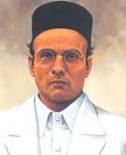 Vinayak Damodar Savarkar (1883–1966) was an Indian freedom fighter, revolutionary and politician. Savarkar created the term Hindutva, and emphasized its distinctiveness from Hinduism. Savarkar's revolutionary activities began when studying in India and England, where he was associated with the India House and founded student societies including Abhinav Bharat Society and the Free India Society, as well as publications supporting the cause of complete Indian independence by revolutionary means. Savarkar published The History of the War of Indian Independence about the Indian rebellion of 1857 that was banned by British authorities. He was arrested in 1910 for his connections with the revolutionary group India House. Following a failed attempt to escape while being transported from Marseilles, Savarkar was sentenced to two life terms amounting to 50 years' imprisonment and moved to the Cellular Jail in the Andaman and Nicobar Islands.
Vinayak Damodar Savarkar (1883–1966) was an Indian freedom fighter, revolutionary and politician. Savarkar created the term Hindutva, and emphasized its distinctiveness from Hinduism. Savarkar's revolutionary activities began when studying in India and England, where he was associated with the India House and founded student societies including Abhinav Bharat Society and the Free India Society, as well as publications supporting the cause of complete Indian independence by revolutionary means. Savarkar published The History of the War of Indian Independence about the Indian rebellion of 1857 that was banned by British authorities. He was arrested in 1910 for his connections with the revolutionary group India House. Following a failed attempt to escape while being transported from Marseilles, Savarkar was sentenced to two life terms amounting to 50 years' imprisonment and moved to the Cellular Jail in the Andaman and Nicobar Islands.
In 1921, he got clemency on an agreement on renouncing from further revolutionary activities. After that he traveled across the country, advocating Hindu political and social unity. He soon joined the Hindu Mahasabha, a political party founded in 1911 and avowed to Hindu political rights and empowerment. Savarkar propagated the ideal of India as a Hindu Rashtra through Hindu Mahasabha and opposed the Quit India struggle in 1942, calling it a "Quit India but keep your army" movement. He criticized Indian National Congress for its acceptance of India's partition, and was one of those accused in the assassination of Indian leader Mohandas Karamchand Gandhi. But he was acquitted as the charges could not be proven.
You might also interested in





0 comments: